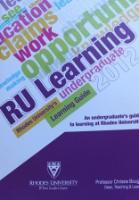
In an effort to bridge the intellectual gap between school and university and assist undergraduate students in fulfilling their academic potential, Rhodes University has launched its first ever undergraduate learning guide. The guide is being made available to first year students during this year’s Orientation Week.
Compiled by Professor Chrissie Boughey, Dean of Teaching and Learning at Rhodes University, RU Learning, An undergraduate’s guide to learning at Rhodes University is designed to introduce undergraduate students to the ideas and practices of knowledge production at university.
Explaining the motivation behind the handbook, Prof Boughey said despite the high entrance requirements at Rhodes, academics still complain that students “can’t do what they want them to do”.
“There is a gap between school and university but I’d argue that there always has been. RU Learning attempts to help bridge that gap by introducing students to some of the values those who will be teaching them hold,” she said.
According to Prof Boughey, the handbook arises out of more than twenty years worth of research and reading in the field of Academic Literacy, which despite being one of the most abused and misused terms in South Africa, includes a set of practices, “things academics do including reading, writing and speaking which arise out of values related to what can count as knowledge and how that knowledge can be known” she said.
“As the Guide tries to explain, academic knowledge is different to other kinds of knowledge like ‘in the street’ knowledge or ‘Weakest Link’ type knowledge because of the way it is always substantiated by evidence and the way claims are carefully limited,” Prof Boughey said.
The guide includes introductions on academic knowledge, academic argument, referencing and plagiarism
Although schools are usually assumed to prepare students for university, Prof Boughey said that not all schools foster this sort of understanding of knowledge. “We are all aware of learners cramming for matric – of accounts of students describing how they ‘shouted the facts into their heads’ for the matric exams in newspaper accounts of why they have done well.
“At a place like Rhodes, this sort of understanding and behaviour isn’t going to allow students to do well.”
In many South African universities, Academic Literacy is taught as a set of neutral skills which are not linked to underpinning values. Prof Boughey has worked extensively on a programme for students enrolled for doctoral study from a range of South African universities introducing them to the ideas about knowledge and knowledge making described above.
“All have said how this was valuable and useful for them. If students who have got to doctoral level still aren’t clear about academic knowledge, what difference could explaining it to undergraduates make?” she said.
The aim in writing the Guide, Prof Boughey explained, was to make the values overt at undergraduate level; “to explain what we value as knowledge in a university like Rhodes and how these values then lead us to act and behave in certain ways.
“By making the values overt, the aim was to allow students to ‘catch on’ to academic learning and the ways of behaving (including reading and writing) which drive it more quickly than they otherwise might.”
Dr Vivian de Klerk, Dean of Students at Rhodes said she fully supports the guide and believes it will enhance the university’s efforts to make academic matters central to the orientation process.
Written in a user-friendly style with a colourful, attractive layout, the guide certainly is accessible to students.
“For me, what’s important is that students read RU Learning and talk about it amongst themselves. Anything that leads them into doing this can only be good,” concluded Prof Boughey.
By Sarah-Jane Bradfield
